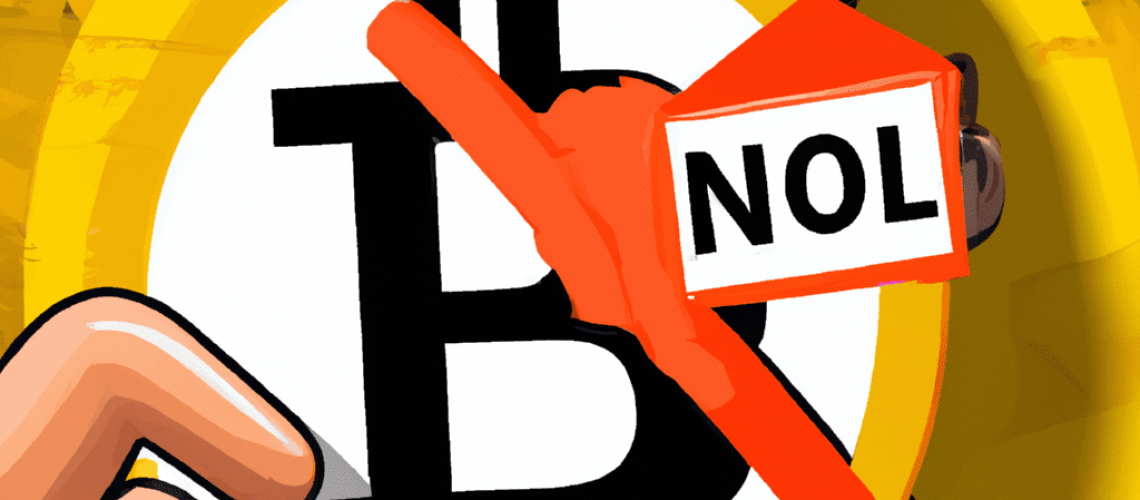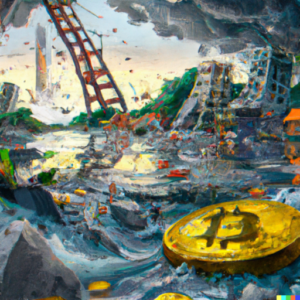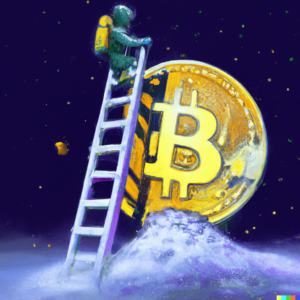Authored by Piriya Sambandaraksa via Medium // Nov 17, 2020
Not everyday you read an article that gets your keyboard fingers excited to respond, but this is one such day as a fellow member on an online Bitcoin and Cryptocurrency social group left a set of delicious questions for other members to chew on. And chew on them I will.
The article was published by Sean Williams on the 17th October 2020 with a goal to deter new potential buyers from buying Bitcoin because of the recent price rise, while I wholeheartedly agree that one should not get into Bitcoin just because of any recent price hike and they are doomed to suffer from the inevitable market correction but the article also makes many false claims that either stem from innocent ignorance or malicious means of misinformation. Here are the alledged reasons why Bitcoin is a bad investment and my response as to why.
1. Bitcoin isn’t really scarce.
The writer wrote that Bitcoin is “only as scarce as its programming dictates. Wheras physical metals such as gold, are limited to what can be mined from the earth”
It is amazing how one could get so many things wrong in one sentence (well, one and a half) and still gets his regurgitation published on (unsurprisingly) Nasdaq of all places!.
I would like to answer this topic in two parts, the first being that while, yes, Bitcoin’s scarcity is dictated by its’ code, what’s important is how the code in question is designed to remain unchanged for any foreseeable future. Of course, any programmer worth his or her keycaps can make changes to the Bitcoin code, increasing the total supply to any numbers or removing it all together but the problem here is the fact that Bitcoin in a voluntary system. No one is forced to run a specific version of the Bitcoin software and if one choose to run a version of Bitcoin software that is not compatible with the rest of the network, his or her node would just be ignored by other nodes.
For example, if I make a change to the Bitcoin code allowing 42 million supply cap, my version of the Bitcoin software will now be operating on a different set of rules and parameters as the rest of the Bitcoin network, therefore, any transaction I make or any blocks I happened to mine would be easily rejected as verifying the validity of a transaction or blocks is a trivial task that can be done by any node running an implementation of the bitcoin software.
To really be able to alter the supply schedule and the total supply of Bitcoin, one has to make the change AND submit it for peer review by hundreds if not thousands of developers worldwide and even if your changes are accepted it will only be able to emerge as a proposal for changes that will need to be accepted by a large majority of the network users. Since the change increases the total supply and thereby reducing the total purchasing power each holder holds, it is unthinkable to see a large majority of Bitcoin users shooting themselves in the foot by accepting such changes. And this is how Bitcoin has remain largely unchanged for over twelve years since its inception, the economic incentives are aligned so that the network participant would not allow for any changes to the core design of Bitcoin as evident by the numerous failed attempts in the past.
The second part of the answer addresses gold’s scarcity. It is utterly foolish to say that gold is limited by the amount that can be mined from the earth. For all practical intent and purposes, gold has unlimited quantities, as do all other resources, in that there exists many order of magnitude more gold that can be mined compared to what has already been mined. The only factor that is limiting the gold supply is human time.
Human time is perhaps the only truly scarce resource we have. As we dedicate more time to the production of anything we can make more of it with absolute certainty. Mining gold takes time and money. the cost of mining gold makes it so that it is not the most profitable endeavor a human can choose to spend time on. Gold is hard to produce and people are better off spending their time producing other goods and services in exchange for gold and money. This is why even when gold was the international monetary standard, human still spend their time producing goods of real value rather than gold. With the current pace of technological advancement, one day it might be possible to feasibly hack gold, that is by finding ways to produce gold at a much lower cost and then we’ll see a huge increase in gold supply, and that future might not be as far as you think.
If we think about it carefully, the only resource that comes close to human time in terms of scarcity is Bitcoin, as the only way top meaningfully alter the supply of Bitcoin is to change humanity itself.

2. It [Bitcoin] has a utility problem
The article argues that to date, there are only 18.51 million Bitcoin in circulation with an estimated 40% of these held by small group of investor and while I agree with the accuracy of the numbers, I do not see the problem here.
It is typical of those indoctrinated by the Keynesian school of economic to think that the only utility for money is to be spent on products and services, but for the majority of human history, that is only a small fraction of money’s true utility.
Certainly, money has its role in being the medium of exchange, a good that is not bought and sold for the good itself but for the exchange of other goods or services. Money as a medium of exchange, and to a certain extent, as a unit of account, helped tremendously in alleviating the problem of a double coincidence of wants and facilitating trades and commerce that is responsible for the society we live in today.
But money also has one other crucial utility that is often a target of contempt under that Keynesian school of though and that is the role of being a store of value.
As I mentioned earlier, the only truly and universally scarce commodity is human time. Human spend their time creating value for themselves and their community, without a strong store of value all these time will have all gone to waste and humanity can never have hoped to rise out of the lifestyle of a monkey.
From ancient times, money is used as a store of value, a store of wealth or what I would like to call, a store of time spent. Money can be anything but humans who choose to store their efforts in fish and apples will inevitable fared much worse that humans who choose to store their efforts in rare sea shells, cattle, or even gold.
The function of a store of value is of the utmost importance when it comes to determining the fates of a group of people. A society with a massive amount of wealth, stored in a strong store of value will have money to invest in future advancement that will allow them to spend their time more effectively. A family that invest in a sound store of value will see their wealth grow from generation to generation and allow them to invest in more productive activities and will further increase their wealth.
Bitcoin may not be the best vehicle for immediate, small, meaningless payments (ie. buying coffee) but as a store of value, its’ utility is unpararelled, surpassing even that of gold in terms of soundness and scarcity.
3.There’s a low barrier of entry
Oh how I love a good laugh. The article argues that while Bitcoin may enjoy a first-mover advantage ‘at the moment’ the underlying technology, the blockchain technology is open, meaning that anyone could create a better Bitcoin at anytime.
While this may sound sensible to many, it hits upon a hard fact that none have ever been successful at dethroning Bitcoin as the hardest, most sound, digital money the world has ever seen.
A concept widely known as ‘immaculate conception’ applies to Bitcoin as the birth of Bitcoin is something that can never be replicated in the same manner in any foreseeable future. Bitcoin is an open sourced, open participation, open to attack system for sound money, creating such a system implies that Bitcoin must be very fragile to attacks in its infancy and such is certainly the case. In the early days of Bitcoin, it only takes a few relatively fast computer to destroy the immutability of the blockchain by reorganizing the blocks through a 51% attack and even the code can easily be colluded to change with ease as there are still a very small number of nodes and miners. But as time passes, the network grows ever larger to the point that it is now, the point where even the largest government on Earth have no chance of shutting it down with force. If other were to mimick Bitcoin now, they would have been attacked, even pranked into oblivion, and the only way for any project that seeks to immitate bitcoin can hope to survive is to have a centralized control or a backdoor into the system in such case it is no longer the sound money that Bitcoin is.
In short, the barrier of entry into the space of open, neutral, sound money is not only very high, it’s inconceivable and anyone who tries will be left with a worthless knockoff that does not offer the value nor the utility that Bitcoin offers.
4. Few (if any tangible means to value bitcoin
There’s a misconception that one can measure the value of a certain asset though complex mathematical functions and other irrelevant factors but the truth is, there is no meaningful ways to measure the value of anything other than through the mechanism of the market.
Naive economist are taught to believe that they have the authority on the valuation of asset price, if this is true then all economist must be filthy rich! but it is not and there is no way to do so.
Goods finds their value through the interaction of supply and demand on the market and a price is used to communicate the production of all kinds of goods. Only the market gets to decide the value of anything and if anyone dares to think they have an authority over the market I’d suggest they put their money where their mouths are.
Bitcoin also goes though the process of price discovery by the market, with boom and bust cycles representing the shifts in demands at each particular moments in time and that is all the valuation that really matters.

5. Fiat currency may work on blockchain
As I’ve stated with altcoins, any attempts to use the blockchain for anything else other that Bitcoin has so far resulted in a cheap knockoff of Bitcoin with no real value.
Blockchain technology in and of itself is of little value to anyone, a system of open, shared ledger that is validated in batches and strung together with a proof of work hash is only of value in a system with no trust. In a centralized system where users are required to trust the central authority, the use of blockchain is akin to the act of voting for your representative, merely a security theatre engineered to allure you with a sense of trust and security where there is none.
Also, Fiat currency on blockchain would go against the incentive of saving with Bitcoin. People use Bitcoin to escape from the system of government issued and government controlled money, bring such money to the blockchain ecosystem would enhance the usability of fiat money but would in no way, offer the value that Bitcoin has to offers, sovereignty from state governopoly.
6. Blockchain is years from being mainstream
This depends on what you define as mainstream, and why you think that it might matters. Bitcoin and blockchain is still in its early stage and has not ‘gone mainstream’ in the sense that it is not widely used by the mass public under the control of mass media under mass government.
Bitcoin has a long way to go before it can become the world’s currency and developments are still on the way. But at the same time, bitcoin has already become more accessible to many more people, especially the unbanked and those looking to unbank themselves as the system is open to voluntary participation without any restriction, all you need is a cellphone with internet connectivity or a satellite dish.
7. Fraud/Theft is serious issue
Fraud and theft is always a serious issue, and that is why Bitcoin is designed in a way that it is not feasible to commit a fraudulent transaction. Bitcoin is impossible to counterfeit and cannot be created out of thin air. The whole premise of the trechnology is based to the much repeated motto of the Cypherpunks “Verify, don’t trust”
Each transaction on bitcoin is verified and checked by every node before broadcasting or passing on the information, the system is design in such a way that the cost of committing a fraudulent transaction is very high as the attacker need to provide a valid proof of work and the only way to do so is by expending tremendous amount of electricity and processing time but the cost of verifying if a block or a transaction is valid is miscule, almost non-existent. This put anyone who wants to try to defraud another on the network at an enormous disadvantage as the economic incentives will be heavily stacked against them.
The total supply of Bitcoin is also checked and verified with every block created to make sure that there are no coins created over the amount calculated from the supply creation schedule.
This is not to say that theft and fraud does not exist on Bitcoin, predators are lurking everywhere to take advantage of the less knowledgeable and Bitcoin is no exception, but if the user learns the proper way to use Bitcoin, the system can prove more secure than any traditional banking system.
Do you know banks have been fined hundreds of billions of dollars for laundering money and committing fraud and they are still operating, this makes Bitcoin’s market cap of a few hundred billion USD looks small in comparison.

8. There’s no regulation
Precisely because it does not need regulation. The only problem with the lack of regulation is the inability to assert government control on economic activities, a privilege that has been long enjoyed by governments around the world all the while indoctrinating its young citizen that without government control, everything will fall in chaos.
And the truth is that it won’t.
Bitcoin is designed in such a way that it can regulate itself. The economic incentives are aligned to keep the system stable and honest. Anyone who tries to attack bitcoin, whether by 51% attack, hacking, finding exploits are better off using their resource to help strengthens the bitcoin network.
It’s beyond the scope of this short response to go into all the details here but it’s suffice to say that, in a trustless environment, a central authority overseeing all activities is not required not welcomed.
9. The tax situation is a nightmare
I would not argue with this. The tax situation is a nightmare if you choose to use Bitcoin in the current economic system. But this is not a problem of bitcoin, it is a problem of the tax system and regulation not being able to account for something they can not control.
Taxation is a socialist drain of economic production. for every 10 dollars spent of tax funded project, we can get a better quality, better value product for a fraction of the cost. Government is one of the largest rent-seeking leech of the modern economy , what once was a facilitator and organizer of economic activities has now become so large that it feeds on productivity itself. So one could say that tax is a nightmare because Bitcoin can create an economic system that does not need governments, that can operate seamlessly throughout the globe and beyond and that it transcend the framework of controlled and centralized governments issued tokens and they are still struggling to find ways to deal with it.
10. All bubbles eventually burst
Agree, but it is worth noting where the ‘air’ is coming from
Bitcoin suffers from boom and busts cycle, much like the modern economy and it does so for the same reason and that is the government’s control of the monetary supply.
It is almost foolish to price bitcoin in terms of USD, as if we compared the dollars to a ruler, it’s a ruler that changes almost every single day, it changes so much that we need a central authority on ruler units to announce the changes each day, that central authority is the Central banks or the FED.
As governments meddled with their economy, issuuing bailouts to irresponsible cartels on wallstreet, people are scambling to find places to put their money. The meteoric rise and fall of Bitcoin’s prices in dollars attracts the attentions of speculators and newcomers, creating a cycle of greed and fear represented in the price.
The cycle is expected to get smoother with time as Bitcoin’s issuance slows down and changes in fiat currency’s value becomes so small that it no longer affects the price of bitcoin.
In short, bitcoin has survived for 12 years and is likely to continue to do so in the future.






